信管专业英语期末考试复习资料.doc
信管专业英语基础知识(1)

17
专业英语中的词汇来源
来源于英语中的普通词,但被赋予了新的词义。 来源于希腊或拉丁语。 由两个或两个以上的单词组成合成词。 派生词(derivation) 借用词 通过词类转化构成新词 名词化
信息管理专业英语
18
来源于英语中的普通词 但被赋予了新的词义
信息管理专业英语 的基础知识(一)
信息管理专业英语
1
信管专业英语基础知识
专业英语的特点 信管专业英语词汇的构词法分析 信管专业英语资料的阅读与翻译 专业英语中的常用语法知识
信息管理专业英语
2
1.1 专业英语的特点
科技文体是自然科学和技术人员从事专业 活动时使用的一种文体,如科学著作、学 术论文、实验报告、设计报告、科技产品 说明书、科技产品操作指导等都属于科技 文体。科技文体讲究逻辑的条理清楚和叙 述的准确严密,与其它文体有显著的区别
信息管理专业英语
21
有短划线“-”连接的合成词
push +up → push-up 上拉 pull + down → pull-down 下拉 paper + free → paper-free 无纸的 jumper + free → jumper-free 无跳线的 user + centric → user-centric 以用户为中心的 power + plant → power-plant 发电站 conveyer + belt → conveyer-belt 传送带 machine + made → machine-made 机制的 reading + room → reading-room 阅览室
信管专业英语基础知识(2)概况

信息管理专业英语
4
阅读方法
略读(Skimming),查读(Scanning), 精读(Reading for full understanding)。 略读是指以尽可能快的速度进行阅读。 查读的目的主要是要有目的地去找出文章 中某些特定的信息。
精读是指仔细地阅读,力求对文章有深层 次的理解,以获得具体的信息。
信息管理专业英语
9
翻译的过程
1、理解阶段 透彻理解原著是确切表达的前提。理解原文 必须从整体出发,不能孤立地看待一词一句。 每种语言几乎都存在着一词多义的现象。因此, 同样一个词或词组,在不同的上下文搭配中, 在不同的句法结构中就可能有不同的意义。一 个词,一个词组脱离上下文是不能正确理解的。 因此,译者首先应该结合上下文,通过对词义 的选择,语法的分析,彻底弄清楚原文的内容 和逻辑关系。
信息管理专业英语 的基础知识(二)
信息管理专业英语
1
信管专业资料的阅读与翻译
专业英语的阅读 专业英语翻译概述 专业术语的翻译 专业英语翻译的基本方法
信息管理专业英语
2
专业英语的阅读
打好语言基本功 在阅读实践中提高阅读能力
掌握正确的阅读方法
信息管理专业英语
信息管理专业英语试题及答案
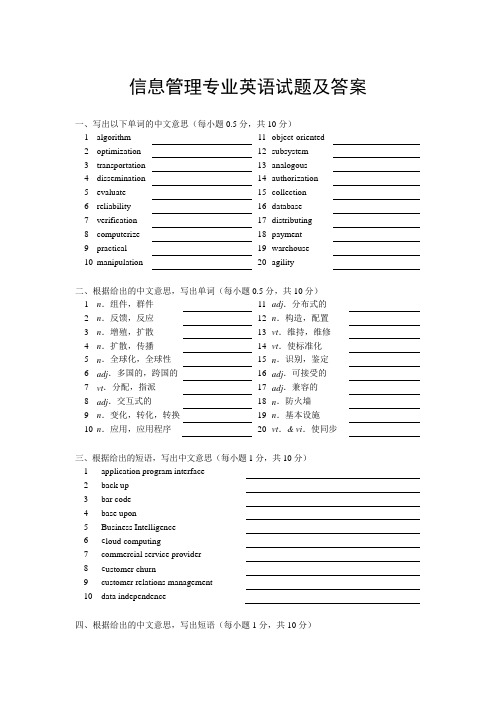
信息管理专业英语试题及答案一、写出以下单词的中文意思(每小题0.5分,共10分)1 algorithm 11 object-oriented2 optimization 12 subsystem3 transportation 13 analogous4 dissemination 14 authorization5 evaluate 15 collection6 reliability 16 database7 verification 17 distributing8 computerize 18 payment9 practical 19 warehouse10 manipulation 20 agility二、根据给出的中文意思,写出单词(每小题0.5分,共10分)1 n.组件,群件11 adj.分布式的2 n.反馈,反应12 n.构造,配置3 n.增殖,扩散13 vt.维持,维修4 n.扩散,传播14 vt.使标准化5 n.全球化,全球性15 n.识别,鉴定6 adj.多国的,跨国的16 adj.可接受的7 vt.分配,指派17 adj.兼容的8 adj.交互式的18 n.防火墙9 n.变化,转化,转换19 n.基本设施10 n.应用,应用程序20 vt.& vi.使同步三、根据给出的短语,写出中文意思(每小题1分,共10分)1 application program interface2 back up3 bar code4 base upon5 Business Intelligence6 c loud computing7 commercial service provider8 c ustomer churn9 customer relations management10 data independence四、根据给出的中文意思,写出短语(每小题1分,共10分)1 数据挖掘2 数据转换3 数据仓库4 脏数据,废数据5 外部存储设备6 遗传算法7 网格计算8 投资决策9 知识发现10 最小冗余五、写出以下缩略语的完整形式和中文意思(每小题1分,共10分)缩略语完整形式中文意思1 B2B2 B2C3 CRM4 DBMS5 ERP6 GIS7 HTTP8 IS9 SCM10 SQL六、把以下句子翻译为中文(每小题1.5分,共15分)1) Do you have any idea how to promote the sales of this product?2) Peter is confident of winning the post as the assistant to the managing director.3) There must be fair play whatever the competition is.4) She showed strong leadership during her first term in office.5) If you have any requirements, ask me.6) The managing director's only concern was how to improve the quality of their products.7) The cost of consumption articles is the first consideration, as far as most ordinary people are concerned.8) Appreciation of works of art is bound to be dominated by a particular kind of interest.9) We sought an answer to the question, but couldn't find one.10) The program was implemented with great efficiency and speed.七、把以下句子翻译为英文(每小题1.5分,共15分)1) 没有好的管理,生意是不可能做好的。
信息管理与信息系统专业英语测试题Ch11Translation

Chapter 11 信息系统的管理如何组织信息系统的活动是一个重大的商业和管理信息系统战略问题。
计算的演变组织今天正面临着一系列艰难的问题,这些问题与管理计算功能相关。
不同组织数据处理的方式已经在过去几年里获得了发展。
在20世纪60年代,数据处理曾是一个后台职能,其职员主要是由直接为实现各种会计职能--如应收账款和应付账款—的自动化的部门工作的专家。
这些早期的系统实现了许多日常文书密集型运作的自动化而被认为是非常成功的。
会计系统项目的成功引发了发展更多数据处理系统的需求。
用户将这些系统的开发委托给了技术专家,这些技术专家并不总是了解他们正试图实现自动化的业务功能。
许多用户开始质疑这些数据处理项目的高额费用和令人失望的结果。
这些问题迫使高级管理人员开始直接参与数据处理项目的规划和控制。
由此导致了管理信息系统部的成立,并且管理信息系统的专业人员受到了使用项目管理的方法以确保系统在预算范围内如期开发完成的培训。
职能部门的管理者自己开始负责挑选最重要的项目和批准这些项目的费用。
20世纪70年代,计算技术开始变得更便宜。
带有软件包的小型机被供应商积极地直接销售给用户。
出于有机会控制自己的硬件和数据的动机的用户获得了大量的这种小型机系统。
其结果是导致了分散计算的纪元。
然而,诸如计算机设备不兼容、缺乏本地系统分析员、缺乏有能力的专业技术人才等问题开始使得用户重新考虑是否该自行运行管理计算机系统。
到20世纪70年代末,大部分组织已经集中了他们的数据中心业务。
集中的一群计算机专业人员管理着硬件、计算机操作、数据库和通讯系统的技术支持。
在许多企业,系统开发职能是分散的,由系统分析员和职能业务部门一起工作。
这种做法使用户对应用开发项目有更多的控制权。
20世纪90年代,大多数组织必须要管理多种技术。
计算技术实际上是以微型计算机、基于计算机的电话系统(程控电话系统)、CAD / CAM系统(计算机辅助设计/计算机辅助管理)和专家系统等形式掌握在几乎每一个经理人的手中。
信管专业英语
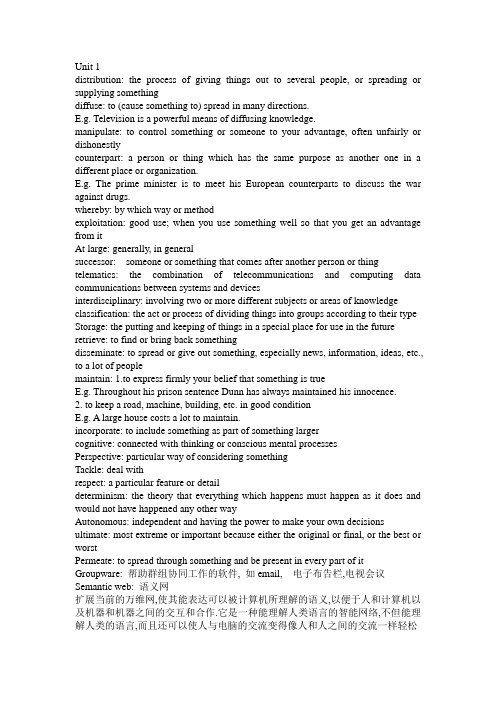
Unit 1distribution: the process of giving things out to several people, or spreading or supplying somethingdiffuse: to (cause something to) spread in many directions.E.g. Television is a powerful means of diffusing knowledge.manipulate: to control something or someone to your advantage, often unfairly or dishonestlycounterpart: a person or thing which has the same purpose as another one in a different place or organization.E.g. The prime minister is to meet his European counterparts to discuss the war against drugs.whereby: by which way or methodexploitation: good use; when you use something well so that you get an advantage from itAt large: generally, in generalsuccessor: someone or something that comes after another person or thing telematics: the combination of telecommunications and computing data communications between systems and devicesinterdisciplinary: involving two or more different subjects or areas of knowledge classification: the act or process of dividing things into groups according to their type Storage: the putting and keeping of things in a special place for use in the future retrieve: to find or bring back somethingdisseminate: to spread or give out something, especially news, information, ideas, etc., to a lot of peoplemaintain: 1.to express firmly your belief that something is trueE.g. Throughout his prison sentence Dunn has always maintained his innocence.2. to keep a road, machine, building, etc. in good conditionE.g. A large house costs a lot to maintain.incorporate: to include something as part of something largercognitive: connected with thinking or conscious mental processesPerspective: particular way of considering somethingTackle: deal withrespect: a particular feature or detaildeterminism: the theory that everything which happens must happen as it does and would not have happened any other wayAutonomous: independent and having the power to make your own decisions ultimate: most extreme or important because either the original or final, or the best or worstPermeate: to spread through something and be present in every part of it Groupware: 帮助群组协同工作的软件, 如email, 电子布告栏,电视会议Semantic web: 语义网扩展当前的万维网,使其能表达可以被计算机所理解的语义,以便于人和计算机以及机器和机器之间的交互和合作.它是一种能理解人类语言的智能网络,不但能理解人类的语言,而且还可以使人与电脑的交流变得像人和人之间的交流一样轻松Value-sensitive design: an approach to the design of technology that accounts for human values in a principled and systematic manner throughout the design process.It is primarily concerned with values that center on human well being, human dignity, justice, welfare and human rights. It connects the people who design systems and interfaces with the people who think about and understand the values of the stakeholders who are affected by the systems.It requires that we broaden the goals and criteria for judging the quality of technological systems to include those that advance human flourishing.Iterative: [formal or specialized] doing something again and again, usually to improve ittransmit: to pass something from one person or place to anotherballoon: to quickly increase in size, weight or importanceencompass: [formal] to include, especially different types of thingsumbrella: something which includes or represents a group or range of similar things administration: the arrangements and tasks needed to control the operation of a plan or organizationPresumably: by assuming reasonably; probably; likely, apparentlyassociate: to connect someone or something in your mind with someone or something elsegrasp: to understand something, especially something difficultmediocre: not very goodtradeoff: a situation in which you balance two opposing situations or qualities Essential: necessary; neededglean: to collect information in small amounts and often with difficultyE.g. From what I was able to glean, the news is not goodunderlying:real but not immediately obviousrobustness: strong and healthy, or (of an object or system) strong and unlikely to break or failfundamental: forming the base, from which everything else develops, more important than anything elseconcern: something that is important to you, or when something is importantE.g. The company’s sole concern is to ensure the safety of its employees. platitude: a remark or statement that may be true but is boring and has no meaning because it has been said so many times before.urgent: needing attention very soon, because importantplea: requestseminal: containing important new ideas and having a great influence on later work E.g. She wrote a seminal article on the subject while she was still a student. paradigm: a model of something ,or a very clear and typical example of something theorem: (especially in mathematics) a formal statement that can be shown to be true by reasoningentropy: the amount of order or lack of order in a systemThreshold: the level or point at which you start to experience something, or at whichsomething starts to happenrubrics: a set of instructions. etc, especially on an examination paper and usually printed in a different style or colorcybernetics: the scientific study of how information is communicated in machines and electronic devices in comparison with how information is communicated in the brain and nervous systemamongst: also among, in the middle of or surrounded by other thingsvital: extremely important; necessary for the success or continued existence of somethingroughly: approximately, not exactlyCryptographic [adj]: [n] the science or study of the techniques of secret writing, esp. code and cipher systems, methods, and the likealgorithm: a set of mathematical instructions that must be followed in a fixed order, and that, especially if given to a computer, will help to calculate an answer to a mathematical problemCipher: a system of writing that prevents most people from understanding the message; a codeUnit 2Gather: collectAssimilate: e.g. It's hard to assimilate (= learn and understand) so much information. Regardless: despite; not being affected by somethingManner: the way in which something is doneFacilitate: to make possible or easiere.g.The new ramp will facilitate the entry of wheelchairs.Deal with: take actionRetrieve: to find or bring back somethingSense: one of the possible meanings of a word or phrasePerceive: to come to an opinion about sth, or have a belief about sthEnormous: extremely largeAssortment: a group of different types of sthStimuli: (singular stimulus)1.something that causes growth or activitye.g. Foreign investment has been a stimulus to the industry.2.specialized something which causes part of the body to reacte.g. The tip of the tongue is sensitive to salt and sweet stimuli and the back of the tongue is sensitive to bitter stimuli.Realistic: accepting things as they are in fact and not making decisions based on unlikely hopes for the futureE.g. Let's be realistic (about this) - I just can't afford to pay that much money. essential: necessary; neededEssence: the basic or most important idea or quality of somethinge.g. The essence of his argument was that education should continue throughout life. in essence: relating to the most important characteristics or ideas of somethinge.g. In essence, both sides agree on the issue.Minute: extremely smallOrganism: a single living plant, animal, virus, etcAfloat [adjective]: floating on watere.g. She spent seven days afloat on a raft.e.g. He managed to keep/stay afloat by holding on to the side of the boat. Academic: relating to schools, colleges and universities, or connected with studying and thinking, not with practical skillsSituate: to put in a particular positionDocument [verb]: to record the details of an event, a process, etc.Refer to: to have recourse or resort; turn, as for aid or information: to refer to one's notes.In short: used before describing something or someone in as few words and as directly as possibleUndertake: slightly formal to do or begin to do something, especially something that will take a long time or be difficultEndeavor: an attempt to do somethingEver: at any timeFigure out: to finally understand something or someone, or find the solution to a problem after a lot of thoughtPattern: a particular way in which something is done, organized or happens Contain: holdPeriodical: a magazine or newspaper, especially on a serious subject, that is published regularlyConsult: 1.to get information or advice from a person, book, etc. with special knowledge on a particular subjectE.g. If the symptoms get worse, consult your doctor.2. to discuss something with someone before you make a decisionE.g. Why didn't you consult me about this?Certain: fixed; agreed upon; settledMechanism: a way of doing something which is planned or part of a system Scheme: an officially organized plan or systemabstract:to make an abstract of; summarize.Deliberate: intentional or plannedSerendipity: the lucky tendency to find interesting or valuable things by chance Myriad [n] or [adjective]: a very large number of somethingAddress: deal withConsistent: not changingWonderful: extremely good ,marvelousStick: PUSH INTOHeavy-duty: describes clothing, machinery or equipment that is stronger than usual so that it can be used a lot, especially in difficult conditionsUnit 3advance: the forward movement of something, or an improvement or development insomethingmerge: to combine or join together, or to cause things to do thisenhance: to improve the quality, amount or strength of somethingtransfer: to move someone or something from one place, vehicle, person or group to anotherTo this day: until nowMobile: able to move freely or be easily movedspawn: to cause something new, or many new things, to grow or start suddenly drive: to provide the power to keep a machine working, or to make something happenavailable: able to be bought, used, or reachedindicate: to show, point or make clear in another waySignificant: important or noticeablePopularize:1.to make something known and understood by ordinary peopleE.g. Television has an important role to play in popularizing new scientific ideas.2. LIKED ; to make something become popularE.g. It was Luciano Pavarotti in the 1980s who really popularized opera.the incarnation of sth :an extreme example, in human form, of a particular characteristic or type of behavioure.g. He was the incarnation of evil (= was extremely evil).conceive: to imagine sthproof: protecting againstaffect: influencetransfer: when something or someone moves or is moved from one place, position, etc. to anotherTake-off [n]: a taking or setting off; the leaving of the ground, as in leaping or in beginning a flight in an airplane.Ultimate: most extreme or important because either the original or final, or the best or worstaccelerate: to happen or make something happen sooner or fasterrelevant: connected with what is happening or being discussedbreakthrough: an important discovery or event that helps to improve a situation or provide an answer to a problemBy far: by a great amounte.g. They are by far the best students in the class.Breach: to break a law, promise, agreement or relationshipAm: abbreviation for amplitude modulation: a type of radio broadcasting in which the strength of the signal changes, producing sound of a lower quality than FM visuals: the picture elements, as distinguished from the sound elements, in films, television, etc.vast: extremely bigelectric: using electricity for powerE.g. an electric blanket/car/kettle/lightElectrical: related to electricityE.g. electrical equipment/goods/devicesan electrical consultantElectronic: 1.of or pertaining to electronics or to devices, circuits, or systems developed through electronics.2. of, pertaining to, or controlled by computers, or computer products and services. accessible: able to be reached or easily gotmigrate: TRA VEL/MOVEInstitution: a large and important organization, such as a university or bankDeal with: to occupy oneself or itselfSet apart: to cause to be noticed; distinguishe.g. Her bright red hair sets her apart from her sisters.analogy: a comparison between things which have similar features, often used to help explain a principle or ideaanalogue: something which is similar to or can be used instead of something else voluminous: of great volume, size, or extentaccurate: correct, exact and without any mistakesaccumulate: [T]to collect a large number of things over a long period of timeE.g. We've accumulated so much rubbish over the years.[I] to gradually increase in number or amountE.g. A thick layer of dust had accumulated in the room.generate: create/produceIn turn: in due order of successionrecipient: a person who receives somethingprogress: movement to an improved or more developed state, or to a forward position Scenario: a description of possible actions or events in the futureAppliance: a device, machine or piece of equipment, especially an electrical one that is used in the house, such as a cooker or washing machineexchange: to give something to someone and receive something from themTune in:To adjust a receiver to receive signals at a particular frequency or a particular program.feature: a typical quality or an important part of somethingUnit 4advancement: an improvement or development of somethinglatest: being the newest or most recent or modernexchange: to give something to someone and receive something from themlively: having or showing a lot of energy and enthusiasm, or showing interesting and exciting thoughtE.g. It's hard work teaching a class of lively children.E.g. There was some lively discussion at the meeting.debate: serious discussion of a subject in which many people take partBurgeoning[adjective]: developing quicklyfrontier: a border between two countriesSupplement[verb]: to add something to something to make it larger or better graphics: images and designs used in books, magazines, etcE.g. computer graphicsCorrespond: to communicate by writing a letter or sending an emailshrink :[I or T] to become smaller, or to make something smallerexpertise: a high level of knowledge or skill nearly: almost, or not completely facilities: the buildings, equipment and services provided for a particular purpose rate: an amount or level of paymentVary: to change or cause something to change in amount or level, especially from one occasion to anotherspan: to extend over or across (a section of land, a river, etc.).The globe: the worldexact: in great detail, or complete, correct or true in every way; precise respective: relating or belonging to each of the separate people or things you have just mentionedRefer to: to have recourse or resort; turn, as for aid or information: to refer to one's notes.suite: a set of connected rooms, especially in a hotelE.g.The singer was interviewed in his £1500 a night hotel suite.Adhere to: 1.to stick FirmlyE.g. A smooth, dry surface helps the tiles adhere to the wall.2.to hold closely or firmlye.g. to adhere to a plan.archive: a computer file used to store electronic information or documents that you no longer need to use regularlythrive: to grow, develop or be successfulconstitute: to form or make somethingBe in its infancy: to be very new and still developingIn the event of sth: if something happensE.g.In the event of a strike, the army will take over responsibility for firefighting. strike: a sudden short military attack, especially one by aircraft or missilese.g. The United Nations has authorized the use of air strikes .dub: to give something or someone a particular name, especially describing what you think of themcontribute: to give something, especially money, in order to provide or achieve something together with other peopleemploy: ( formal) to use somethingTake charge of: responsibility for controlling or looking after somethingMaintain: to keep a road, machine, building, etc. in good conditionIn the making: in the process of being made; developing or evolving; growingE.g. Our space scientists see history in the making.predominant: more noticeable or important, or larger in number, than others agency: organization/a business which represents one group of people when dealing with another groupCharge: to ask an amount of money for something, especially a service or activityIn turn: in due order of successionunique: being the only existing one of its type or, more generally, unusual or special in some waygovern: to control and direct the public business of a country, city, group of people, etcrelate: to find or show the connection between two or more thingsE.g. Researchers are trying to relate low exam results and/to/with large class sizes. Carry out: 1.to put into operation; executee.g.He doesn't have the funds to carry out his design.2.to effect or accomplish; completeE.g.They carried out their plan without incident.session: a period of time or meeting arranged for a particular activitytake care of sth :to deal with somethingReside: (formal) to live, have your home or stay in a placeLie in:to consist or be grounded (usually fol. by in)E.g.The real remedy lies in education.Unit 5analogy: a comparison between things which have similar features, often used to help explain a principle or ideacontext: 1.the text or speech that comes immediately before and after a particular phrase or piece of text and helps to explain its meaningE.g. In this exercise, a word is blanked out and you have to guess what it is by looking at the context.2. The circumstances in which an event occurs; a setting, backgroundE.g. This small battle is very important in the context of Scottish history.involve: to include someone or something in something, or to make them take part in or feel part of itTypically: used when you are giving an average or usual example of a particular thing E.g. Tickets for such events will typically cost around thirty dollars.frequently: often; many times; at short intervalsVia[prep]: through; usingBanner: 1. a long piece of cloth, often stretched between two poles, with a sign written on it, usually carried by people taking part in a march2.+ ad/advertisement: an advertisement that appears across the top of a web page entitle: to give a title to a book, film, etcE.g. Her latest novel, entitled 'The Forgotten city', is out this week.Overview: a short description of something which provides general information about it, but no detailsRevenue: the income that a government or company receives regularlytrillion: the number 1 000 000 000 000Top: [T] to do, pay, etc. more or better than anyone elseE.g. "They've offered me £1000." "I'm afraid we can't top that."Mark: [S] the level intended or wantedE.g. Sales have already passed the million mark.segment: any of the parts into which something (especially a circle or sphere) can be divided or into which it is naturally dividedhousehold: [C + singular or plural verb]a group of people, often a family, who live togetherapproximate: not completely accurate but closestrong: [after noun] having the stated number of people, members, etc.E.g. Our social club is currently about eighty strong.extremely: in an extreme degree; exceedinglyconvenient: easy to obtain, use, or reach; made for convenienceWade: to walk through water with difficulty because of the pressure of the water against your legsCopious: in large amounts; more than enoughe.g. He took copious notes during the lecture.Target: to direct advertising, criticism or a product at someoneE.g.The paper is targeted specifically at young people.Originally: first of all; at the origin; at firstFacilitation: the act or process of facilitatingintroduce: to put something into use, operation or a place for the first time onwards: beginning at a particular time and continuing after itConfidential: secret, often in a formal, business or military situationencompass: [formal] to include, especially different types of thingsOffshore: (of companies and banks) based in a different country with different tax rules that cost them less moneyever: at any timeimpetus: something which encourages a particular activity or makes that activity more energetic or effectivesector: one of the areas into which the economic activity of a country is dividedE.g. In the financial sector, banks and insurance companies have both lost a lot of money.sufficient: enough for a particular purposedeploy: to use something or someone, especially in an effective wayE.g. The company is reconsidering the way in which it deploys its resources/staff subsequent: happening after something elsesubstantial: large in size, value or importancerudimentary: 1.describes methods, equipment, systems, etc. that are simple and not very well developed2.basicE.g. Her knowledge is still only rudimentary.collapse: the sudden failure of a system, organization, business, etcBricks and mortar: property in the form of buildings usually when considered as an investmentmortar: a mixture of sand, water and cement or lime that is used to fix bricks or stones to each other when building wallsrecognize: to accept that something is legal, true or importantE.g. You must recognize the seriousness of the problems we are facing..valuable: Valuable information, advice, etc. is very helpful or importantNiche market: a small area of trade within the economy, often involving specialized (= unusual and made for a few people) productsgrocer: a person who owns or works in a shop selling food and small things for the homesubsidiary :a company which is owned by a larger companybarrier: anything that prevents people from being together or understanding each other proprietor:a person who owns a particular type of business, especially a hotel, a shop or a company that makes newspapers.Expose: to be made publicConduct: to organize and perform a particular activitySolely: only and not involving anyone or anything elseDispatch: to send something, especially goods or a message, somewhere for a particular purposeFare: the money that you pay for a journey on a vehicle such as a bus or train Entrant: a person who enterssignon: logonBid: an offer of a particular amount of money for something which is for saleIn reality: in factCharge: to ask an amount of money for something, especially a service or activity Unit 6productivity: the rate at which a company or country makes goods, usually judged in connection with the number of people and the amount of materials necessary to produce the goodsagent: a person who acts for or represents anotheragency: organization/a business which represents one group of people when dealing with another group [unit 4]Firm: a company or businessRegion: a particular area or part of the world, of the body, etc., or any of the large official areas into which a country is dividednation: [C] a country, especially when thought of as a large group of people living in one area with their own government, language, traditions, etccapacity: the total amount that can be contained or produced, or (especially of a person or organization) the ability to do a particular thingCapability: the ability to do something [unit 5]Apply: to make use of something or use it for a practical purposecurrency: the money that is used in a particular country at a particular time exchange: to give something to someone and receive something from them [unit 4] relevant: connected with what is happening or being discussed [unit 3]Fine-tune: to make very small changes to something in order to make it work as well as possibleE.g. She spent hours fine-tuning her speech.heretofore: [formal or legal] [adverb] : before this point in time; previously Plentiful: If something is plentiful, there is a lot of it availablepervasive: [formal] present or noticeable in every part of a thing or place . planetary: relating to planetsscale: the size or level of something, especially when this is largeE.g. My parents used to entertain friends on a large/small scale (= they had large/small parties).Corporation: a large company or group of companies that is controlled together as a single organizationskilled: skillful, proficienttap: to get or make use of somethingE.g. For more than a century, Eastern cities have expanded their water supplies by tapping ever more remote sources.utilize: [formal] to use something in an effective wayCritic: 1.someone who says that they do not approve of someone or something2. someone whose job is to give their opinion about something, especially films, books, music, etc.claim: to say that something is true or is a fact, although you cannot prove it and other people might not believe ithave yet to: If you have yet to do something, you have not done itE.g. They have yet to make a decision.achieve: to succeed in finishing something or reaching an aim, especially after a lot of work or effort ; realize, reachObserve: [formal] to notice or seemobile: able to move freely or be easily moved [unit 3]undermine: to make someone less confident, less powerful or less likely to succeed, or to make something weaker, often graduallyE.g. Criticism just undermines their confidence.xenophobia: extreme dislike or fear of foreigners, their customs, their religions, etc. maintain: to continue to have; to keep in existence, or not allow to become less argue: to give the reasons for your opinion, idea, belief, etc.affect: to have an influence on someone or something, or to cause them to change Regulation: an official rule or the act of controllingpolicy: a set of ideas or a plan of what to do in particular situations that has been agreed officially by a group of people, a business organization, a government or a political partyboundary: a real or imagined line that marks the edge or limit of something [Border: a strip that goes around or along the edge of something, often as decoration E.g.The dress was white with a delicate lace border.]highly: very, to a large degree, or at a high levelState: [slightly formal] to say or write something, especially clearly and carefullysector: one of the areas into which the economic activity of a country is divided [unit 5]exclude: to intentionally not include something Antonym: includeroughly: approximately, not exactlydecline: when something becomes less in amount, importance, quality or strength mark: to represent or show a characteristic of a person or thing or feeling dramatically: suddenly or obviouslyannual: happening once every year, or relating to a period of one yearrespective:relating or belonging to each of the separate people or things you have just mentioned [unit 4]Scope: the range of a subject covered by a book, programme, discussion, class, etc transformation: a complete change in the appearance or character of something or someone, especially so that they are improved; changeoverimpact: a powerful effect that something, especially something new, has on a situation or persondiffuse: to (cause something to) spread in many directions [unit 1]At large: in general; usually, or in most situations [unit 1]manner: the way in which something is doneobtain: [formal] to get something, especially by asking for it, buying it, working for it or producing it from something elsea run of sth: A run of something is a continuous period during which it lasts or is repeatedidentical: exactly the same, or very similarflexible: able to change or be changed easily according to the situation; changeable Devise: to invent a plan, system, object, etc., usually cleverly or using imagination Branding: the act of giving a company a particular design or symbol in order to advertise its products and servicesE.g. The successful branding and marketing of the new beer has already boosted sales and increased profits.Effective: successful or achieving the results that you wantIntermediary: a medium or meansTemporary: not lasting or needed for very long; impermanentLead: a winning position during a race or other situation where people are competingE.g. For the first time in the race Harrison is in the lead.Innovate: to introduce changes and new ideasLest: in order to prevent any possibility that something will happenE.g. They were afraid to complain about the noise lest they annoyed the neighbours. as opposed to: rather thanMerely: used to emphasize that you mean exactly what you are saying and nothing moreInherent: existing as a natural or basic part of somethingAdaptable: able or willing to change in order to suit different conditions。
(11)Unit 5《信息管理与信息系统专业英语》networked economy

网络经济给我们的生活带来许多变化。一个重大 变化就是像消费者广泛关注的土地,劳力,资金, 这些已成为稀少性商品的界定的变化。因此寻求 通过网络经济方式去做生意的公司必须要把这种 变化考虑进去。
安徽财贸职业学院 计算机系
Networked Economy
《 SQL Server 数据库管理与开发》
安徽财贸职业学院 计算机系
《 SQL Server 数据库管理与开发》
Networked Economy
词汇(Vocabulary)
1. 2.
3.
4. 5. 6. 7.
Networked Economy Take…into account Digital divide (p.98) Sales tax/tax revenue Power plant (power station) Global positioning system (GPS) Personal digital Assistants (PDAs)
In addition to this new version of scarcity, the networked economy has created or amplified (扩大) other economic issues, including the division (separation) between those who have access to the internet and electronic commerce(??) and those who do not, and whether and how to tax electronic commerce.
31. 安徽财贸职业学院 计算机系
信息管理与信息系统专业 英语

信息管理与信息系统专业英语英文回答:Information Management and Information Systems.Information management is the collection, storage, organization, and dissemination of information. It is a critical function for any organization, as it allows for the effective use of information to make decisions and achieve goals. Information systems are the tools and technologies used to manage information. They can range from simple spreadsheets to complex enterprise resource planning (ERP) systems.The field of information management and information systems is constantly evolving, as new technologies emerge and new ways of working are developed. This has led to a growing demand for professionals with the skills and knowledge to manage information effectively.Skills and Knowledge Required for Information Management and Information Systems Professionals.Professionals in the field of information management and information systems typically need to have the following skills and knowledge:A strong understanding of information management concepts and principles.Proficiency in a variety of information systems software applications.Excellent communication and interpersonal skills.The ability to work independently and as part of a team.A strong work ethic and a commitment to excellence.Career Opportunities for Information Management and Information Systems Professionals.There are a wide range of career opportunitiesavailable for professionals with skills and knowledge in information management and information systems. Some of the most common job titles include:Information manager.Information systems manager.Database administrator.Systems analyst.Business analyst.Project manager.Professionals in these roles can work in a variety of industries, including healthcare, finance, manufacturing, and government.Education and Training for Information Management and Information Systems Professionals.There are a variety of educational and training programs available for professionals who want to work inthe field of information management and information systems. Some of the most common programs include:Bachelor's degree in information management or information systems.Master's degree in information management orinformation systems.MBA with a concentration in information management or information systems.Certificate programs in information management or information systems.Professional Development for Information Management and Information Systems Professionals.In order to stay up-to-date on the latest trends and technologies in the field of information management and information systems, professionals should pursue ongoing professional development. This can be done through a variety of activities, such as:Attending conferences and workshops.Reading industry publications.Taking online courses.Participating in online forums and discussion groups.中文回答:信息管理与信息系统专业。
(12)Unit 6《信息管理与信息系统专业英语》DSS
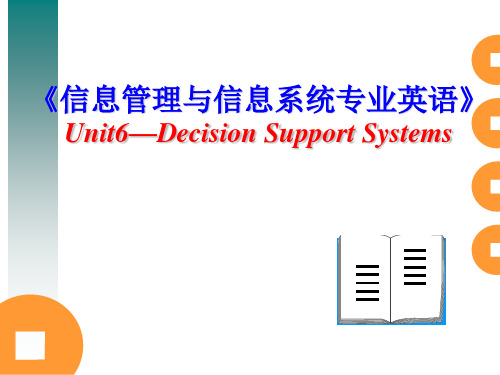
Machinery --Special Interest Group on Business Data Processing ) 15. AI (artificial intelligence) 16. Model-driven DSS
安徽财贸职业学院 计算机系
《 SQL Server 数据库管理与开发》
Decision Support Systems
词汇
17. Information system design and optimization system 18. Firmware/groupware/shareware 19. Vantage point/starting point /end point 20. Sort out
安徽财贸职业学院 计算机系
《 SQL Server 数据库管理与开发》
Decision Support Systems
词汇
6. 7. 8. 9. 10.
Hypothesis Software package/ software module/software model (p136) expert system Office automation system Algorithm (decision tree, support vector machine, association rule, clustering, classification, bayesian )
p134sqlserver数据库管理与开发安徽财贸职业学院计算机系decisionsupportsystemsdecisionsupportsystemsemphasisdifficultemphasis难点与重点难点与重点interactivecomputerbasedinformationsystemflexibletoolhelpsmanagersfocusfuturep134一个决策支持系统是一个互动的基于计算机的信息系统它提供了灵活的分析工具来帮助决策者针对未来进行决策
(6)Unit 3《信息管理与信息系统专业英语》E-C

Part I--E-commerce I--E
《 SQL Server 数据库管理与开发》
--Limitations of electronic commerce --Limitations
Because electronic commerce relies on computer networks, the shipment (the action of sending, carrying, and delivering goods) of any physical good purchased using electronic commerce must still take place through traditional means, that is , when you buy a physical goods over the Web, it must be picked from a shelf in a warehouse, packed for shipment, and physically moved from the warehouse to the customer via a package delivery service.
sqlserver数据库管理与开发安徽财贸职业学院计算机系parteecommercecommerce电子商务electroniccommerce计算机应用软件computerapplications在网络上通信communicatingovernetworks交易双方twoparties整个交易或部分交易atransaction电子通信手段进行交易electroniccommunicationselectronicdatainterchange安全交易协议securetransactionagreement网络的成熟与普及thematuritywideadoption信用卡的普及thepermeationcreditcards作为assqlserver数据库管理与开发安徽财贸职业学院计算机系parteecommercecommerce电子商务定义为
信息管理与信息系统专业英语词汇总结[精选]
![信息管理与信息系统专业英语词汇总结[精选]](https://img.taocdn.com/s3/m/72814e34a7c30c22590102020740be1e650ecc83.png)
信息管理与信息系统专业英语词汇总结[精选]第一篇:信息管理与信息系统专业英语词汇总结[精选]Lesson1 distributed applications 分布式应用程序 competitive advantage 竞争优势 data warehouses 数据仓库incompatible databases 不兼容数据库decision support systems 决策支持系统executive information systems 执行信息系统DBMS——database management systems 数据库管理系统entry 款目metadata 元数据mainframe computer大型计算机 desktop computer台式计算机 laptop computer膝上型计算机 spreadsheet 电子表格LAN------local area network 局域网 database server 数据库服务器 user views 用户视图 data security 数据安全性 data integrity 数据完整性 concurrent user 并发用户 data updating 数据更新 data redundancy 数据冗余consistency of data and metadata 数据和元数据的一致性distributed database 分布式数据库telecommunications network 远程通讯网Lesson2 automatic indexing自动标引 human indexing 人工标引extraction indexing 抽词标引assignment indexing赋词标引controlled vocabulary 受控词表 non-substantive words 非实意词index terms 标引词automatic stemming 自动抽取词干 weight 权值clue words 提示词 inverted file 倒排文档absolute frequency 绝对词频relative frequency 相对词频information retrieval 信息检索syntactic criteria 句法规则word string 词串NLDB——Natural Language DataBase 自然语言数据库 MAI——machine-aided indexing 机器辅助标引recall ratio 查全率precision ratio 查准率 descriptor 叙词 thesaurus 叙词表semantic vocabulary 语义词表 concept headings 概念标题consistency of indexing 标引的一致性 underassignment 欠量赋词 overassignment 过量赋词 back file 备份文件 main heading 主标题 subheading 副标题 access point 检索点Lesson3 machine-readable form 机读形式 source document 源文献subject indexing 主题标引back-of-the-book indexing书后标引 indexing scheme 标引方案NFAIS——National Federation of Abstracting and Information Services(美国)国家文摘与信息服务联合会scope notes 范围注释 permuted list 轮排词表CAS——Chemical Abstracts Service 化学文摘社 character set 字符集statistical correlation 统计关联ISI——Institute for Scientific Information(美国)科学情报社co-citation indexing 共引文标引SCI——Science Citation Indexes 科学引文索引SSCI——Social Science Citation Indexes 社会科学引文标引bibliometric analysis 书目计量分析Lesson4 performance enhancement 性能改善scarce resources 稀缺资源 proxy servers 代理服务器JAVA executables JAV可执行程序source code 源代码streaming media 流媒体 outsourcing 业务外包wild card characters 通配符real-time traffic analysis 实时流量分析 static web pages 静态网页ISDN——Integrated Services Digital Network 综合服务数据网URL——Uniform Resource Locator 统一资源定位符HTML——Hypertext Markup Language 超文本标识语言CGI——Common Gateway Interface 公共网关接口XML——Extension Markup Language 扩展标识语言 OR——Operation Record 操作记录IIS——Internet Information Services 网络信息服务Lesson5 IR——information retrieval 信息检索 search engine spam 搜索引擎垃圾 soft computing 软计算 data mining 数据挖掘information fusion 信息融合 classification 分类 clustering 聚类thesaurus construction 词表构建 Web page categorization 网页分类JPG——Joint Photographic Experts Group 图像文件格式GIF——Graphics Interchange Format 可交换的图像文件格式PNG——Portable Network Graphic 可移植的网络图像文件格式 the petitive intelligence 竞争情报 search engine 搜索引擎artificial intelligence 人工智能drill-down access 深度查询accessibility 可获得性knowledge discovery 知识发现quantitative data 定量数据qualitative data 定性数据virtual warehouses 虚拟(数据)仓库 virtual library 虚拟图书馆relational database 关系数据库research and development 研发(研究与开发)directory 指南newsletter 简讯intelligent search agents 智能检索代理 information resources 信息资源 performance evaluation 性能评价Lesson10CIO——chief information officer信息主管ERP——Enterprise Resource Planning 企业资源规划CRM——Customer Relationship Management 客户关系管理Collaborative Applications Environment 协同应用环境workflow package 工作流软件包Lesson11rights of information users 信息用户的权利obligations of information users 信息用户的义务terms and conditions 条款第二篇:信息管理与信息系统专业英语复习资料信管专业英语复习资料【P1】An information society is a society in which the creation, distribution, diffusion, use, and manipulation of information is a significant economic, political, and cultural activity.(译)信息社会是一个以信息创建、发布、传播、使用和管理为重要经济、政治和文化活动的社会。
信管专业英语期末考试复习资料
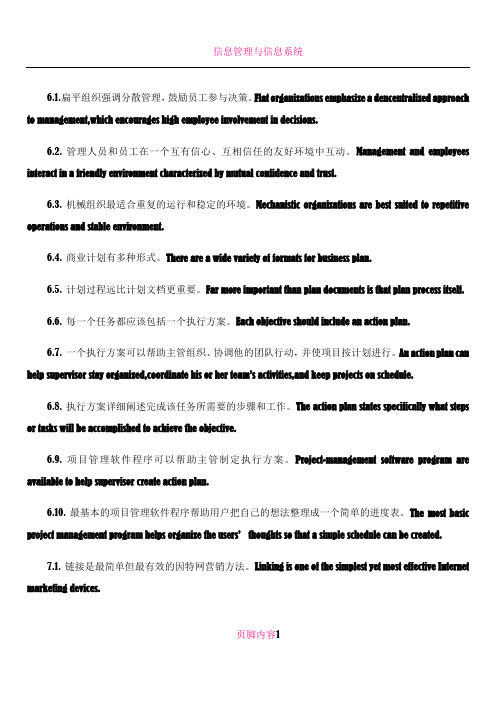
6.1.扁平组织强调分散管理,鼓励员工参与决策。
Flat organizations emphasize a dencentralized approach to management,which encourages high employee involvement in decisions.6.2. 管理人员和员工在一个互有信心、互相信任的友好环境中互动。
Management and employees interact in a friendly environment characterized by mutual confidence and trust.6.3. 机械组织最适合重复的运行和稳定的环境。
Mechanistic organizations are best suited to repetitive operations and stable environment.6.4. 商业计划有多种形式。
There are a wide variety of formats for business plan.6.5. 计划过程远比计划文档更重要。
Far more important than plan documents is that plan process itself.6.6. 每一个任务都应该包括一个执行方案。
Each objective should include an action plan.6.7. 一个执行方案可以帮助主管组织、协调他的团队行动,并使项目按计划进行。
An action plan can help supervisor stay organized,coordinate his or her team’s activities,and keep projects on schedule.6.8. 执行方案详细阐述完成该任务所需要的步骤和工作。
The action plan states specifically what steps or tasks will be accomplished to achieve the objective.6.9. 项目管理软件程序可以帮助主管制定执行方案。
信息管理与信息系统专业英语考试复习题

信息系统与信息管理专英语复习一、词汇题(英译汉+汉译英以下分栏的是课件上部分红色单词,未分栏的是与专业相关的课件上的词汇,个人感觉比较重要,所以整理了一下,翻译均来自网上在线翻译,可能个别有问题,发现后请及时改正。
不周之处以课件为准。
祝大家考出好成绩!)collar(项圈)Startled(大吃一惊)gasped (气呼呼)project management:项目管理Project initiation and PID Requirements elicitation(获取) & collection Requirements collation(校对) & conflict managementO-O programmingParallel programming Complexity(复杂性)Cabling & Wiring(布电缆和电线)inclusions(加入部分)compatibility(兼容性)interference(干扰)side-effects(副作用)Direct cut-over to new partof systemParallel running of new partwith previous partPilot(试点) cut-over of onedepartmentPiecewise(分段) cut-overPrepare rolling plan(后续计划) for future upgradesPay all outstandingaccounts(未付清的帐)temptation(诱惑)contingency(不测事件)anticipated(期望)deviate(偏离轨道)irresistible(无法抗拒)dictate(要求)trade-offs(权衡)inherent(不可分割)phenomenon(现象)axes(中心)juggle(杂耍)disabled (残疾)handicapped(弱智)availability (可用性)phases(阶段)participate(参与)objective(目标)segments(分块)fixed(固定)size(规模)complexity (复杂程度)Preliminary(初步)investigationcross-life-cycle(横跨生命周期)Fact-finding(事实发现)Presentation(交流讲座)Approximate(大约的,近似的)productivity(工作效率)quality(素质)ongoing(持续不断的)Participants(参与人员)Management(管理人员)analysts(分析员)supervisor(主管)alternative(可选的)Submit(提交)corporate(公司的)charters(章程)paperwork(文书工作)pervasive(蔓延)sense(认识)justify(证明。
信管专业英语期末考试复习资料
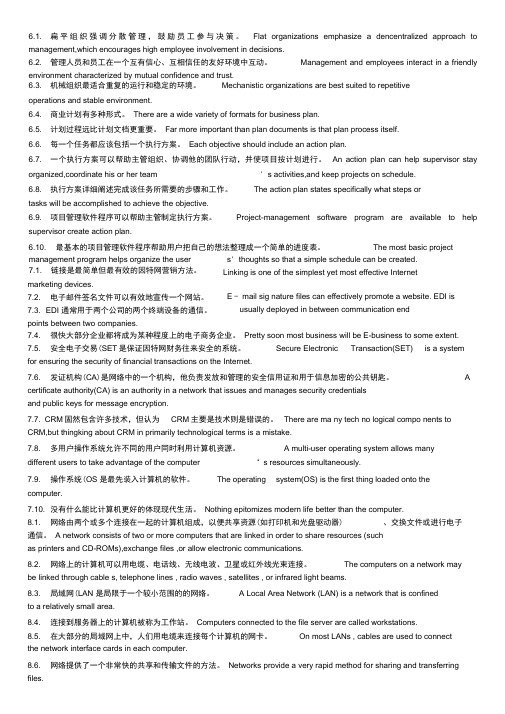
6.1. 扁平组织强调分散管理,鼓励员工参与决策。
Flat organizations emphasize a dencentralized approach to management,which encourages high employee involvement in decisions. 6.2. 管理人员和员工在一个互有信心、互相信任的友好环境中互动。
Management and employees interact in a friendlyenvironment characterized by mutual confidence and trust. 6.3. 机械组织最适合重复的运行和稳定的环境。
Mechanistic organizations are best suited to repetitive operations and stable environment.6.4. 商业计划有多种形式。
There are a wide variety of formats for business plan.6.5. 计划过程远比计划文档更重要。
Far more important than plan documents is that plan process itself. 6.6. 每一个任务都应该包括一个执行方案。
Each objective should include an action plan.6.7. 一个执行方案可以帮助主管组织、协调他的团队行动,并使项目按计划进行。
An action plan can help supervisor stay organized,coordinate his or her team' s activities,and keep projects on schedule. 6.8. 执行方案详细阐述完成该任务所需要的步骤和工作。
管理信息系统复习大纲(英文)
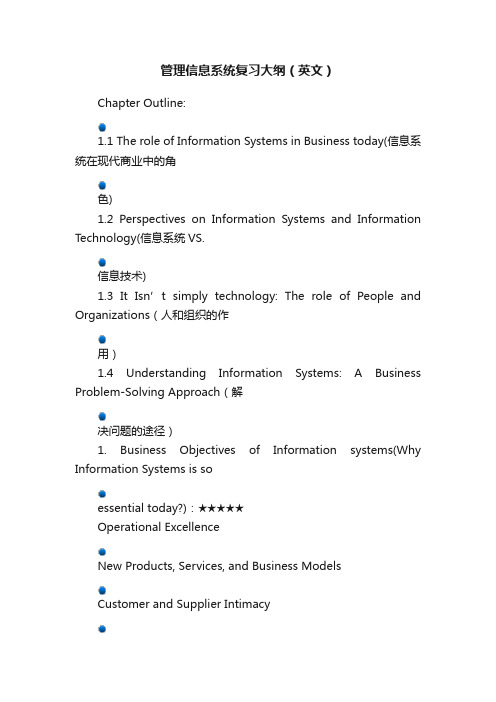
管理信息系统复习大纲(英文)Chapter Outline:1.1 The role of Information Systems in Business today(信息系统在现代商业中的角色)1.2 Perspectives on Information Systems and Information Technology(信息系统VS.信息技术)1.3 It Isn’t simply technology: The role of People and Organizations(人和组织的作用)1.4 Understanding Information Systems: A Business Problem-Solving Approach(解决问题的途径)1. Business Objectives of Information systems(Why Information Systems is soessential today?):★★★★★Operational ExcellenceNew Products, Services, and Business ModelsCustomer and Supplier IntimacyImproved Decision MakingCompetitive AdvantageSurvival2. Information system:a set of interrelated components that collect, process, store,and distribute information to support decision making and control in an organization. ★3. Information VS Data ★★★★★Information: data that have been shaped into a form that is meaningful anduseful to human beings.Data: are streams of raw facts representing events occurring inorganizations or the physical environment before they have been organized and arranged into a form that people can understand and use.4. Input, Output, Processing, Feedback(反馈;回复;成果,资料)★5. Business Processes: are logically related tasks and behaviors for accomplishingwork. (chapter2, p43) ★★★★★6. problem-solving approach ★★Chapter Outline:2.1 Components of a Business(商务的构成)2.2 Types of Business Information Systems(商务信息系统的类型)2.3 Systems That Span the Enterprise(企业范围的系统)2.4 The Information Systems Function in Business(信息系统的功能)1. Basic Business Functions: ★★★Sales and MarketingFinance and AccountingManufacturing and ProductionHuman resources2. Business Processes: the role of business processes in organization: the efficiency ofa business firm depends on how well its business processes are designed and coordinated. ★★★★★★3. the hierarchy of management: ★★Senior managementMiddle managementOperational managementKnowledge workersData workersProduction or service workers4. Types of Business Information SystemsSystems for Functional Perspective: Sales and Marketing Systems,Manufacturing and Production Systems, Finance and Accounting Systems, Human Resources SystemsSystems from a Constituency Perspective: ★★★Transaction Processing Systems(TPS),Management Information Systems(MIS),Decision-Support Systems(DSS),Executive Support Systems(ESS)5. Enterprise Applications: ★★★★★Enterprise SystemsSupply Chain Management SystemsCustomer Relationship Management SystemsKnowledge Management SystemsChapter Outline:3.1 Using Information Systems to Achieve Competitive Advantage(使用信息系统取得竞争优势)3.2 Competing on a Global Scale(全球竞争)3.3 Competing on Quality and Design(质量和设计竞争)3.4 Competing on Business Processes(业务流程竞争)1. Types of Competitive Advantage ★★★★★Barriers to entry that restrict supplyDemand controlEconomies of ScaleProcess efficiency2. Information system strategies for dealing with competitive forces: ★★Low-Cost leadershipProduct differentiationFocus on market nicheStrengthen customer and supplier intimacy3. Value chain model ★★4. best practices ★★★5. core competency:6. virtual company: uses networks to link people, assets(资产), and ideas, enablingit to ally (结盟)with other companies to create and distribute products and services without being limited by traditional organizational boundaries or physical locations. ★★7. TQM, Six sigma ★★8. BPR(business process reengineering): radical rethinking and redesign of businessprocesses to take advantage of information systems. How could it help business become more competitive? ★★★★Chapter Outline:8.1 Enterprise Systems8.2 Supply Chain Management Systems8.3 Customer Relationship Management Systems8.4 Enterprise Applications: New Opportunities and Challenges1. Enterprise software is built around thousands of predefined business processesthat reflect best practices. ★★★2. MPS, MRP ★★★★★3. Supply chain: a network of organizations and business processes for procuringraw materials, transforming these materials into intermediate and finished products, and distributing the finished products to customers.4. upstream, downstream ★★5. just-in-time strategy ★★6. bullwhip effect ★7. push-based model, pull-based model ★★8. Supply chain planning systems, supply chain execution systems ★★9. CRM Systems capture and integrate customer data from all over the organization,consolidate the data, analyze the data, and then distribute the results to various systems and customer touch points across the enterprise.10. cross-selling, up-selling, bundling ★★11. churn rate★Chapter Outline:9.1 Electronic Commerce and the Internet9.2 Electronic Commerce9.3 M-Commerce9.4 Electronic Commerce payment systems1. Information asymmetry ★★2. Syndicator ★3. digital wallet ★★4. digital cash ★Chapter Outline:10.1 Decision making and information systems10.2 Systems for decision support10.3 Intelligent systems for decision support10.4 Systems for managing knowledge1. Types of decisions: ★★★Structured decisions——Operational Management——TPS, MISSemistructured decisions——Middle Management——DSSUnstructured decisions——Senior Management——ESS2. Sensitivity analysis ★3. GIS: Geographic information systems ★★4. GDSS: Group decision-support system5. expert system6. case-based reasoning ★★7. Knowledge Management ★8. tacit knowledge ★Chapter Outline:11.1 Problem Solving and Systems Development11.2 Understanding the Business Value of Systems and Managing Change11.3 Alternative systems-building approaches11.4 Modeling and Designing systems: Structured and Object-Orientedmethodologies1. Problem solving: ★★★Defining and understanding the problemDevelop alternative solutionsChoose the best solutionSystem analysisSystem designImplement the solution2. feasibility study: financial, technical, and organizational ★3. conversion: parallel strategy, direct cutover strategy, and phased approachstrategy ★4. tangible benefits, intangible benefits5. alternative systems-building approachesTraditional systems development lifecyclePrototyping ★★End-user developmentApplication software packages and outsourcingRapid application development for e-business6. Structured methodologies7. Object-Oriented development ★★★。
信管专业英语期末考试复习资料
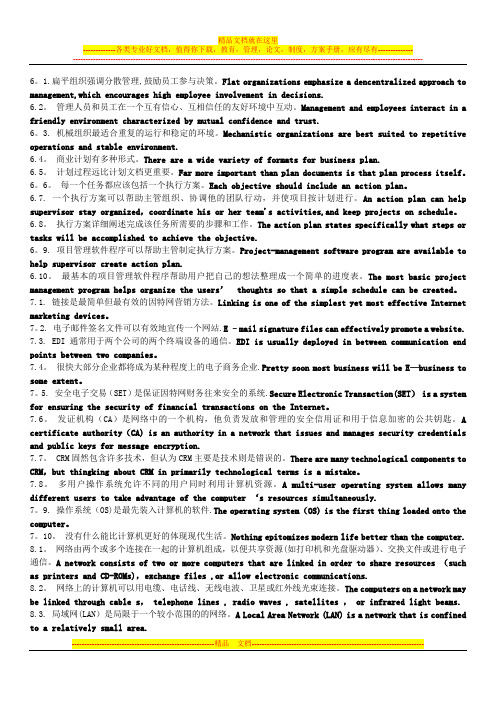
6。
1.扁平组织强调分散管理,鼓励员工参与决策。
Flat organizations emphasize a dencentralized approach to management,which encourages high employee involvement in decisions.6.2。
管理人员和员工在一个互有信心、互相信任的友好环境中互动。
Management and employees interact in a friendly environment characterized by mutual confidence and trust.6。
3. 机械组织最适合重复的运行和稳定的环境。
Mechanistic organizations are best suited to repetitive operations and stable environment.6.4。
商业计划有多种形式。
There are a wide variety of formats for business plan.6.5。
计划过程远比计划文档更重要。
Far more important than plan documents is that plan process itself。
6。
6。
每一个任务都应该包括一个执行方案。
Each objective should include an action plan。
6.7. 一个执行方案可以帮助主管组织、协调他的团队行动,并使项目按计划进行。
An action plan can help supervisor stay organized,coordinate his or her team's activities,and keep projects on schedule。
6.8。
执行方案详细阐述完成该任务所需要的步骤和工作。
The action plan states specifically what steps or tasks will be accomplished to achieve the objective.6。
信息管理与信息系统专业英语

一、词汇1.缩写词的全称1)CAD—Computer Aided Design (计算机辅助设计)2)AI—Artificial Intelligence (人工智能)3)OOA—Object-Oriented Analysis(面向对象分析)4)DSS—Decision Support System(决策支持系统)5)FTP—File Transfer Protocol(文件传输协议)6)GIS—Geographic Information System(地理信息系统)7)SDLC—System Development Life Cycle(系统开发生命周期)8)EPSS—Electronic Performance Support System(电子绩效支持系统)9)MBO—Management Buy-Outs (管理者收购)10)IT—Information Technology(信息技术)11) CRM—Customer Relationship Management(客户关系管理)2.中文词的英语解释1)信息熵information Entropy2)可执行性研究feasibility study3)数据仓库Data Warehouse4)个人数据处理Personal data processing5)全球信息基础Global Information Infrastructure6)程序评估与审计技术Program Evaluation and Review Technique7)公钥加密Public key cryptography8)客户关系管理Customer Relationship Management9)交互式多媒体展示会Interactive multimedia exhibition10)商业流程分析Business Workflow Analysis二、名词解释(连线题,看懂能选出就行)1)MIS: Management Information System(MIS),are information systems,typically computer based,that are used within an organization.( 管理信息系统,通常是基于计算机技术,供某组织内部使用的一种信息系统。
- 1、下载文档前请自行甄别文档内容的完整性,平台不提供额外的编辑、内容补充、找答案等附加服务。
- 2、"仅部分预览"的文档,不可在线预览部分如存在完整性等问题,可反馈申请退款(可完整预览的文档不适用该条件!)。
- 3、如文档侵犯您的权益,请联系客服反馈,我们会尽快为您处理(人工客服工作时间:9:00-18:30)。
6.1.扁平组织强调分散管理,鼓励员匚参与决策。
Flat organizations emphasize a dencentralized approach to management, which encourages high employee involvement in decisions・1 2.管理人员和员工在一个互有信心、互相信任的友好环境中互动。
Management and employees interact in a friendly environment characterized by mutual confidence and trust.3.机械组织最适合重复的运行和稳定的环境。
Mechanistic organizations are best suited to repetitive operations and stable environment・6.4.商业计划有多种形式。
There are a wide variety of formats for business plan.6.5.计划过程远比计划文档更重要。
Far more important than plan documents is that plan process itself.6.6.每一个任务都应该包扌舌一个执行方案。
Each objective should include an action plan.7. 一个执行方案可以帮助主管组织、协调他的团队行动,并使项目按计划进行。
An action plan can help supervisor stay organized, coordinate his or her team' s activities, and keep projects on schedule.8.执行方案详细阐述完成该任务所需要的步骤和工作。
The action plan states specifically what steps or tasks will be accomplished to achieve the objective.9.9.项口管理软件程序可以帮助主管制定执行方案。
Project-management software program are available to help supervisor create action plan.6.10.最基本的项目管理软件程序帮助用户把自C的想法整理成一个简单的进度表。
The most basic project management program helps organize the users' thoughts so that a simple schedule can be created.7.1.链接是最简单但最有效的因特网营销方法。
Linking is one of the simplest yet most effective Internet marketing devices.10. 2.电子邮件签名文件Rf 以有效地宣传一个网站oE - mail signature f 订es can effectively promote a website.3. EDT通常用于两个公司的两个终端设备的通信。
EDI is usually deployed in between communication end points between two companies.4.很快大部分企业都将成为某种程度上的电子商务企业。
Pretty soon most business will be E-business to some extent ・7.5.安全电子交易(SET)是保证因特网财务往来安全的系统。
Secure Electronic Transaction (SET) is a system for ensuring the security of financial transactions on the Internet・7.6.发证机构(CA)是网络中的一个机构,他负责发放和管理的安全信川证和川于信息加密的公共钥匙。
A certificate authority(CA) is an authority in a network that issues and manages security credentials and public keys for message encryption.7.7. CRM固然包含许多技术,但认为CRM主要是技术则是错误的。
There are many technological components to CRM, but thingking about CRM in primarily technological terms is a mistake・7.8.多川户操作系统允许不同的川户同时利丿LI计算机资源。
A multi-user operating system allows many different users to take advantage of the computer 's resources simultaneously.7.9.操作系统(OS)是最先装入计算机的软件。
The operating system (OS) is the first thing loaded onto the computer.10.没有什么能比计算机更好的体现现代生活。
Nothing epitomizes modern life better than the computer.网络由两个或多个连接在一起的计算机组成,以便共亭资源(如打印机和光盘驱动器)、交换文件或进行电子通信。
A network consists of two or more computers that are linked in order to share resources (such as printers and CD-ROMs), exchange files , or allow electronic communications.2.网络上的计算机nJ以用电缆、电话线、无线电波、卫星或红外线光束连接。
The computers on a network may be linked through cable s, telephone lines , radio waves , satellites , or infrared light beams・8.3.局域网(LAN)是局限于一个较小范围的的网络。
A Local Area Network (LAN) is a network that is confined to a relatively small area.8.4.连接到服务器上的计算机被称为工作站o Computers connected to the file server are called workstations.8.5.在大部分的局域网上中,人们用电缆来连接每个计算机的网卡。
On most LANs , cables are used to connect the network interface cards in each computer.6.网络提供了一个非常快的共亭和传输文件的方法。
Networks provide a very rapid method for sharing and transferring files.7.今天,它主要是通过网络或电子数据交换來完成。
Now , it is mainly done through Internet and ElectronicData Interchange(EDI).企业能够通过因特网收集关于产阳、购买者和竞争对手的信息,从而增强其竞争力。
Businesses can gather information on products , buyers and competitors through Internet so as to increase their own competitiveness.OSI 体系结构被划分为七层。
The OS I architecture is split between seven layers. 11. 10.网络--般是指一组计算机共同丁•作。
A network typically means a group of computers working together.12. 1.面向对象设计不是唯一的设计类型。
Object-oriented design is not the only type of design.2.类是具有共同结构和相同行为的对象的集合。
A class is a set of objects that share a common structure and a common behaviour.3.数据流程图模拟一个系统中的事件和过程(如传输数据的活动)o Data Flow Diagrams (DFDs) model events and processes (i ・ e. activities which transform data) within a system ・9. 4.逻辑数据结构模型(LCDs)用另一方式描述一个系统的信息和数据oLogical Data Structure (LDSs) represent a system , s information and data in another way.9. 5.每个子系统描述数据处理过程的一个加工过程或活动。
Each subsystem represents a process or activity in which data is processed.9. 6.存储设备和显示设备是硬件。
The storage devices and display devices are hardware ・7. 一个域就是一个单独的信息块。
A field is a single piece of information.& 一个文件就是一些记录的集合。
A file is a collection of records. 6. 9. 一个记录就是一些域的完整集合。
A record is one complete set of fields ・ 10.软件可以分为两个基本类别:系统软件和应用软件。
